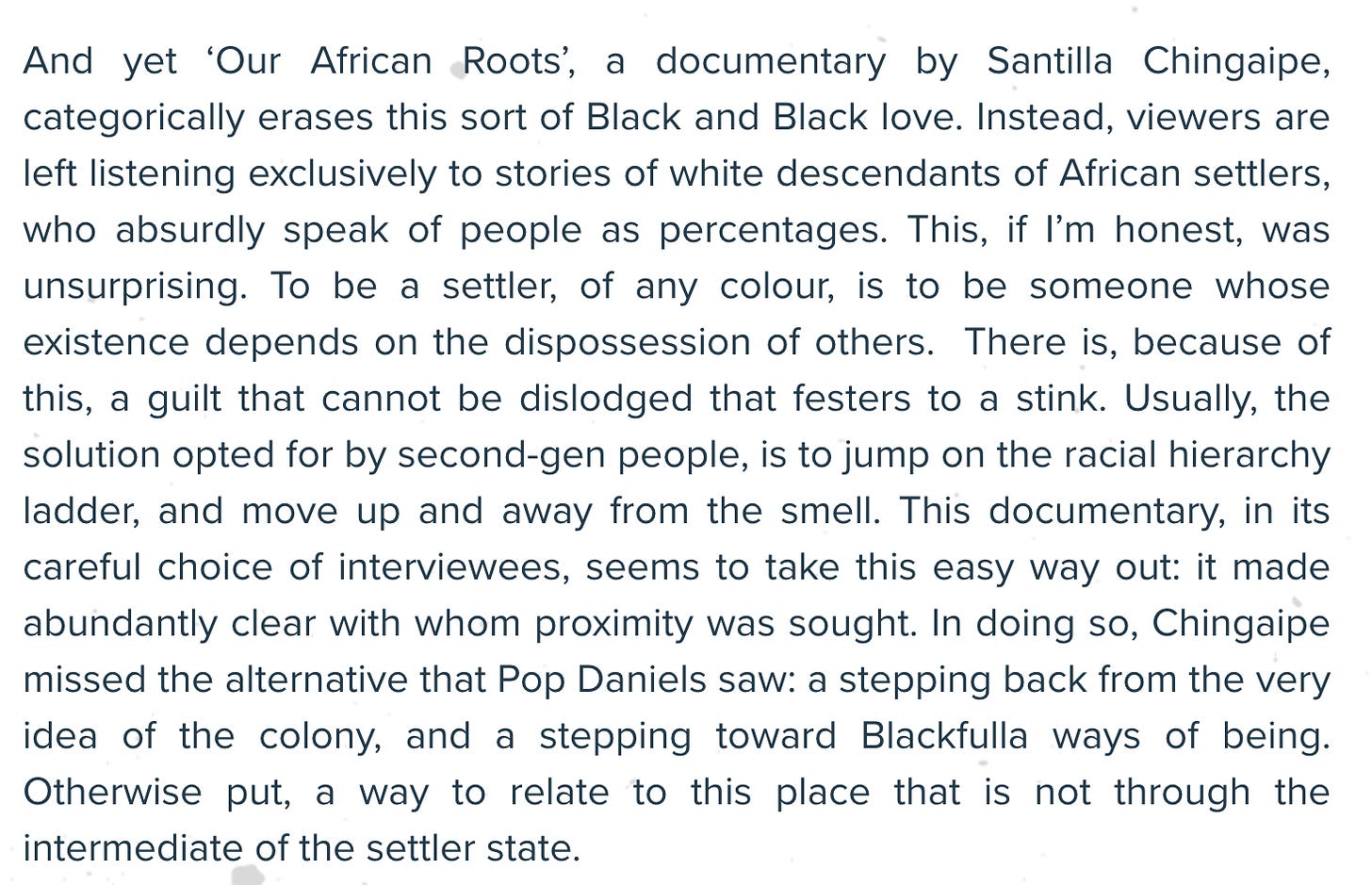Gudamulli!
I’m currently working on a piece for Monday - it will be a long-read about a black death in custody - a case I have been following for the past 11 years. Today I’m also thinking of the family of JC, who was shot by a cop in Geraldton, on the last day of the trial. The story for Monday is also about another police shooting.
In the meantime, I thought I would expand this newsletter to include a weekly round-up of great pieces from black writers. If you have any recommendations, please share them with me, or add your comments below.
Earlier this week, there was a great deal of controversy around SBS’ new documentary ‘Our African Roots’, directed by Santilla Chingaipe. Now while the subject matter is obviously important, the problems lay in the framing, which seemed to be predicated on a desire to ‘diversify’ white history by claiming proximity to the coloniser, while also erasing the dispossession and violence wrought on First Nations people. There were many important critiques in the aftermath that came from both blackfellas and black people in this colony.
What followed was also a conversation about black solidarity. What does it mean to be a black settler on stolen Indigenous lands? The documentary failed to look at the unique relationships between black people and blackfellas and could not see beyond a black experience outside of this appeal to whiteness. Gamilaraay mathematician and writer Dr Jared Fields wrote a brilliant response drawing on his family history - in which his great grandfather - an African American man from Boston who had come here in the 19th century - found freedom not in the “centre” - but on the “margins”, in his love and care for the Gamilaraay community where he made his home and family. Dr Fields’ piece was one of the best I’ve read on this, and it’s such a shame that this documentary fell far short of what would be an amazing, and unknown story of black solidarity and love in this colony:
Here is a brief excerpt from his piece on IndigenousX and you can read the full article here.
The other article I want to bring your attention to is by the brilliant Nayuka Gorrie. I found myself reading and re-reading this and I honestly think it is one of the best essays I have ever read. It was again, published in IndigenousX, which is becoming home to not only the best black writing in this country but the best writing full stop.
In this article, Nayuka looks at the history of medical violence and racism both here and overseas and is a nuanced view of why there is a lot of vaccine hesitancy amongst our mob. Nayuka though weighs up this ethical dilemma and decides getting the vaccine is in the best interests of not only their family but their community. You can read the full piece here.
What are you reading?
I have a couple of books on the go right now, but I’m currently immersing myself in the literature about abolition.
I’ve just started “The Abolition of Prison” by Jacques Lesage de La Haye, and I’m going to follow that up with Mariame Kaba’s “We Do This Til We Free Us”.
Prison abolition is seen as almost a crazy pipe dream but it shouldn’t be. The prison is a site of violence and there is a long history of abolitionist writing showing and revealing this (I also have on my book shelf Angela Davis’ Are Prisons Obsolete?). Lesage de La Haye, who was a formerly incarcerated person, wrote about the failure of prisons: “It is truly alarming that the violence, the brutality, the ineffectiveness, not to mention the uselessness and harmfulness of prison, have been demonstrated since the beginning of the nineteenth century. Michael Foucault recalls: For the prison, in its reality and visible effects were condemned immediately as the great failure of penal justice”.
I think as writers looking at ‘justice’, we must have in our focus the end of prisons. They can’t be reformed. In the words of Lesage de La Haye, “prison ought to be deconstructed in order to never be reconstructed”.
Please let me know if you have any recommendations and leave your thoughts in the comments! I would love to hear what you think.








We’re on a similar reading journey! It’s not a book, but I recently listened to an amazing and wide-ranging interview with abolitionist Ruthie Wilson Gilmore: https://open.spotify.com/episode/2KcnGrzpwSRrL5wWJ19rn5?si=_jwJdfpSSQW8thXcdu3JAg
Prison by any Other Name by Schenwar and Law was a great read if you’re interested!